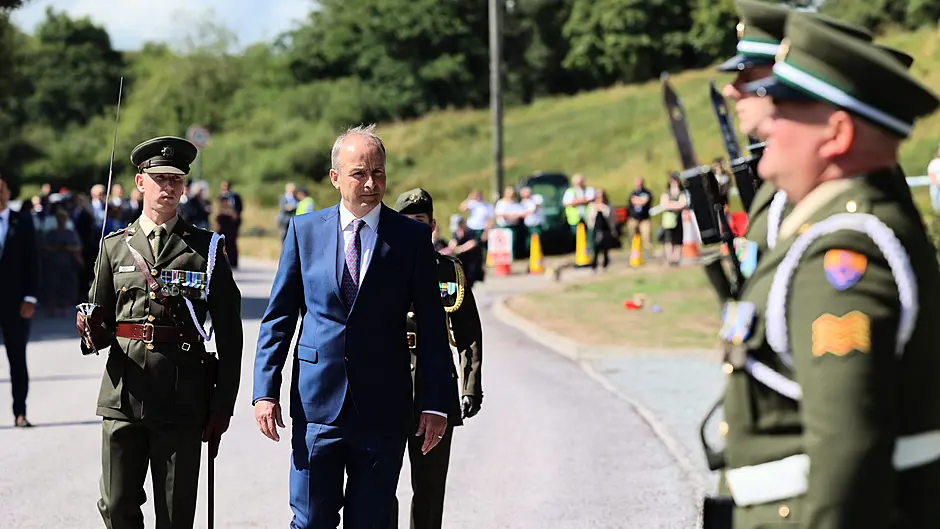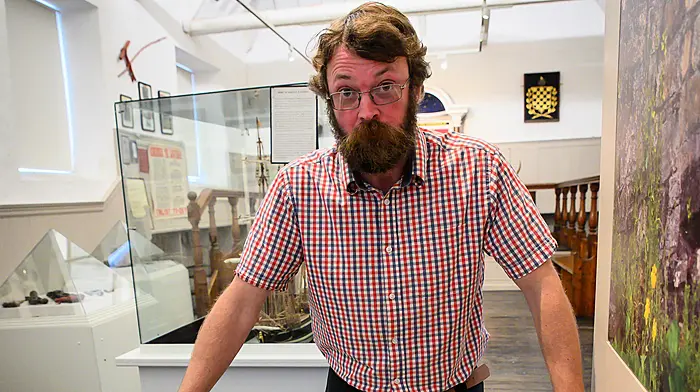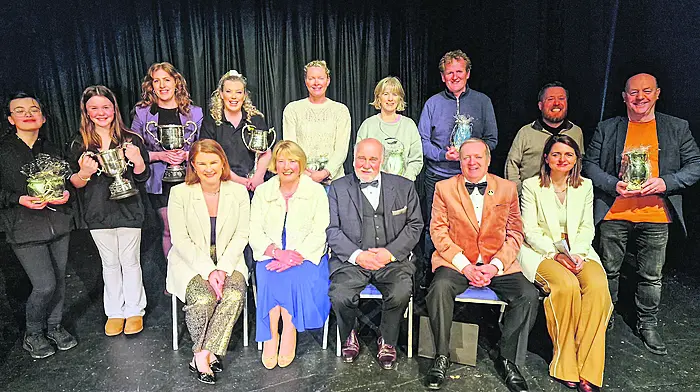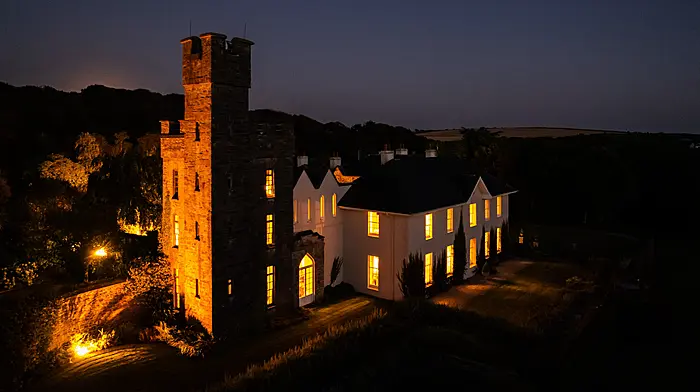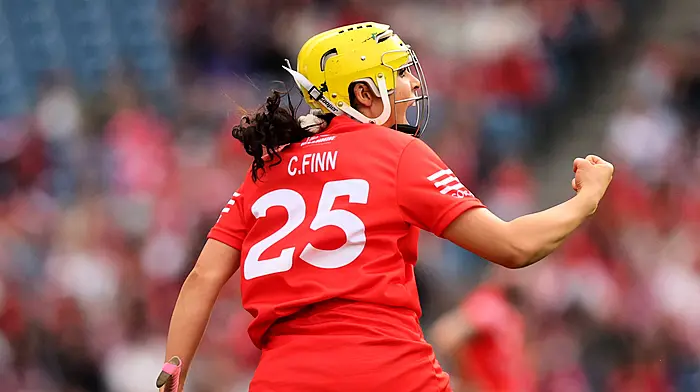The following are the full speeches made by the Taoiseach Micheál Martin and the Tánaiste, Leo Varadkar, at the Béal na Bláth commemoration on Sunday.
The Fianna Fáil leader Micheál Martin said, 'As the first anniversary of Michael Collins’ death approached, a small group gathered in this place to honour a man whose presence was for them still vivid. Close friends from the army as well as his sister stood here in front of a simple wooden cross which one of them had erected. They told brief stories of his life and prayed for him before heading away, deeply affected by their loss.
'As we gather today to mark the centenary of his death, we do not have their direct personal connection with him. There is no one here who experienced his charisma, his youthful energy, his booming voice or the strength of his handshake.
'Yet this commemoration is an important statement of remembrance and gratitude. It is a mark of our respect for one of the great heroes of Irish history, a man who played an irreplaceable role in securing Irish freedom.
'For the political tradition represented by Fine Gael this has long been a place to meet together and to remember a leader who has always provided a special inspiration for them.
'However, it is also an important site for all who honour and respect our independence struggle and our democracy.
'It is one of the greatest achievements of the last century that different democratic traditions have worked hard to show respect and develop a new understanding of each other.
'And we should acknowledge the special role which the Collins family and the Commemoration Committee have played in this over many decades.
'Fifty years ago their work led one of my predecessors, Jack Lynch, to designate the Collins homestead as a national monument and to take it into the care of the state. At the same time the Fianna Fáil Minister for Defence Jerry Cronin accepted an invitation to attend this commemoration and laid a wreath on behalf of the government. The invitation to my late colleague Brian Lenihan to speak here twelve years ago marked another important moment.
'These and many other generous and open gestures have helped ensure that democratic Irish nationalism has found so much common ground in looking back at our history and the role of our founders in winning independence.
'It is my honour and privilege to be here as Taoiseach and as leader of Fianna Fáil to join you in paying tribute to Michael Collins. I am proud that my Department has played a leading role in redeveloping this memorial and making it secure and accessible so that generations to come can continue to visit here to pay their respects.
'He is today, as much as he has ever been, an inspiring symbol of how much we can achieve in the face of even the most terrible odds.
'In his short 31 years he rose from a modest West Cork home to become a leader in a struggle for independence – a struggle which is responsible for what is today one of the longest continuous democracies in the world.
'Everything he achieved in his life came from his great abilities and recognition of his leadership by his peers.
'While we all know the outlines of his story and his impact, we should do far more to understand and recognise the brilliance of his service to his country.
'A former colleague wrote of him:“Tall, dark, handsome and strongly built, he had all the dash, initiative, and devilment that fitted him for the role of a great guerrilla warrior. His ability in the handling of finance, as well as his power of speech, were exceptional for a man of his age and education. But that characteristic which stood him in good stead under all conditions was his sense of humour.”
'Here in West Cork he was immersed in its defining characteristics of self-reliance, determination and compassion. He was shaped by this community and this remained his greatest strength.
'After spending 10 years working in London in various clerical jobs, he returned to Ireland in early 1916 and for what became six and a half dramatic years which transformed his country.
'Collins was never into hero-worship and he always saw himself as part of a broad movement.
'After his service as Aide de Camp to Joseph Mary Plunkett in the GPO, imprisonment was a time for him to reflect on new ways forward.
'He was a truly brilliant and creative administrator – something which was recognised by the senior role which he took in the reorganised Sinn Fein. Together with his great friend Harry Boland he was central to the overwhelming victory of the party under the leadership of de Valera in the 1918 election.
'That election was a dramatic turning point in our history - and it is at the heart of a profound difference between those who fought the War of Independence and those who have tried to abuse the memory of that struggle.
'At the first possible moment, the separatist struggle obtained and retained full democratic legitimacy – a legitimacy which was central to its rapid progress and victory.
'Facing down an empire which spanned the world required a lot more than determination and public support – it required a new type and level of organisation never before seen in an independence struggle. At the very heart of this was Michael Collins.
'Witnessing this, no one could argue with the fact that the Irish people were ready to control their own future.
'Collins was a sincere advocate for the Treaty and he was just as committed to trying to prevent the drift towards civil war.
'A new generation of historians has looked at the fateful events which led to the civil war using a range of sources never before available.
'Their work challenges us to look again, and especially to appreciate just how many efforts were made to bridge the gap between opponents.
'Collins’ electoral pact and his draft constitution were brave and powerful gestures. They could have worked, but people in London who knew little of our country and showed it little good faith blocked these initiatives and caused immense damage.
'And once the major strategic victories of the first two months of the civil war had been achieved by the provisional government there is no doubt that Collins was determined to bring about a rapid end to the conflict.
'He did not demonise others because he remembered all he had gone through with them as colleagues and friends. He never celebrated deaths of opponents and showed deep compassion – openly weeping when he heard of the deaths of former colleagues like Cathal Brugha.
'And news of his own death is reported to have been met with silence and prayers when it reached republican prisoners.
'It is perhaps the greatest tragedy of Collins’ death that it deprived us of our best hope for reconciliation. The bitterness which grew out of the events of the following year showed how much was lost in this place.
'We should also do more to remember Collins’ relentless work to try to protect Northern nationalists and his opposition to the partition of our country which had been imposed in 1920.
'Throughout the months before his death he continuously challenged London to protect the rights of nationalists in the North. Again and again he tried to stop the systemic violence directed against them.
'What he wasn’t willing to do was to take some action which would have led to the sort of scenes later experienced in places like India and Palestine when partition was imposed. The near-complete expulsion of minorities and mass violence defined those partitions and there is every reason to believe that could have occurred here.
'Collins acutely felt the outrage of creating a state based on a sectarian headcount - but he also didn’t believe that a new Ireland could be built through a deadly conflict between the two major traditions which share our island.
'For too long people ignored this fact. The truly historic breakthrough of democratic politics in the Good Friday Agreement gave to our generation, as Seamus Mallon put it, a new dispensation – an opportunity to put sectarianism and artificial division behind us.
'That remains our challenge. To do the hard work of moving words to real action on building a shared island – an island where we show respect for our past but we embrace the much harder work of reaching out and respecting each other.
'Collins always had a sense of the bigger picture of our complex society and the challenge of bringing it together.
'When we look back over what has been achieved in the last century I have no doubt that Collins would see a country transformed – an Irish state which has proved to the world that it can achieve great things when it is free to shape its own destiny.
'There are those who claim in ever-more passionate speeches that Ireland has achieved nothing in 100 years – and that we are close to being some sort of failed-state. This says more about their cynicism than it does about our country.
'We should never forget that in 1922 Ireland was one of the poorest countries in the world. Michael Collins’ father had himself survived one of the most traumatic and deadly famines ever recorded.
'With few natural resources. little industry and separated from a significant part of its historic territory, the state which emerged from our revolution faced dramatic hurdles.
'And it overcame those hurdles time and time again.
'Two million more people live here today than a century ago.
'We have recorded one of the highest and most sustained increases in life expectancy of any country - today over 25 years longer than it was in 1922, with reductions in infant and maternal mortality equal to those seen anywhere.
'In independent Ireland each new generation has had greater access to education and achieved higher levels of education.
'And we have progressed from being one of the most peripheral and poorest countries in the world to the most globally connected of all in terms of trade and employment.
'No one doubts that we today face urgent challenges – but those who dismiss the progress we have achieved are denying reality.
'And if they fail to respect what our country has achieved, then how can anyone expect that they will protect this progress?
'Critical for our country is that we have avoided the extremes of the left and right which brought such misery to other countries in the last century.
'There has been a lazy tendency to dismiss Irish politics as so-called ‘civil war politics’. However the truth is that after 1923 no party advocating a return to violence has ever won more than 4% of the vote. The parties who have led our governments since then have done so because they have worked to move beyond the civil war and to develop our country in the interests of all.
'The centrist, democratic politics which emerged in our country has achieved far more than any other approach could possibly have achieved.
'Ireland’s politics has allowed an honest choice between parties which differ on many important issues, but have shared a commitment to democracy, to Ireland’s place in Europe and to creating new opportunities.
'This is true to the best and most important element of the tradition founded by Wolfe Tone and which was central to our revolution – that is the commitment to keep evolving, to be open to new ideas and be focused on the needs of today and the future.
'We need to do more to confront the new revisionism of those who try to denigrate our country’s achievements and who try to claim legitimacy for violent campaigns waged in the face of the opposition of the Irish people.
'We have to give no quarter to their attempts to link themselves to the men and women who fought our revolution over a century ago.
'The fact is that our great revolutionary generation radically changed our possibilities and every major piece of progress our country has secured since then has been through centrist and democratic politics.
'Our centrist politics has ensured that Ireland has stood for the values of freedom, human rights and democracy in the world.
'It is the reason why we joined a union of European democracies, why we are active in promoting the rule of law as a fundamental principle and why we have been resolute in our support for Ukraine as its stands against the imperialist aggression of Russia.
'And it is this tradition which will enable us to overcome the biggest challenges we face today.
'The ability for parties which have different programmes to find a way to work constructively together is central to this government. It is why we can and we will deliver ambitious programmes on the critical issues of housing, climate change and health. It is why we have recovered from the fastest-hitting recession of modern times and have an economy strong enough to help people in the face of rapidly rising international prices.
'And this willingness to find common ground is why we have been able to take an approach to remembering even the most difficult parts of our history in an inclusive, respectful and constructive way.
'The crowd gathered here today, the presence of representatives of different traditions and the role of Óglaigh na hÉireann in honouring a fallen leader shows how far we have come since the first anniversary of Michael Collins’ death.
'In his short 31 years Michael Collins made a deep, lasting and positive impact on our country.
'Shaped by the ideals of his community, he devoted his life to his country.
'He was a dynamic leader who could both inspire people and, in the middle of a bloody conflict, build a new administration from nothing.
'He is a key reason why we have been able to build a country which, while it still faces major challenges, has been transformed for the better.
'For this, today, as much as ever before, he deserves our gratitude and he deserves to be remembered as one of the greatest Irishmen to have ever lived.
MEANWHILE, the Fine Gael leader Leo Varadkar addressed the 'Taoiseach, ministers, mayor of Cork County Council Danny Collins, the lord mayor of Cork City, Deirdre Forde, the Chief of Staff of the Defence Forces, the Lieutenant General Sean Clancy, members of the Defence Forces, Canon O’Mahony, members of the Collins family, colleagues and friends.
'First of all,' he said, 'I want to our offer heartfelt thanks to Cllr Garret Kelleher, and the members of the Béal na Bláth Commemoration Committee and your forbears, for your admirable work in making this event a worthy tribute to our lost leader, this year and every other.
'For so many who admire Michael Collins, the ceremony at Béal na Bláth is an annual pilgrimage but for you it’s months of planning and preparation. Working in particular this year with Cork County Council on the restoration of this site means so much to so many.
'Colleagues, friends, this is a painful site of memory for so many connected with Michael Collins. It is a place of death, forever associated with a senseless killing in an unnecessary war in which brother turned on brother.
'It is fitting that we gather here and remember, because what happened here one hundred years ago changed the course of Irish history.
'Ever since that day, we have gathered at this solemn spot to pay tribute to the lost leader, our soldier politician, whose life helped create the Irish State, and whose death shocked and traumatised a divided nation.
'By honouring Michael Collins, we reaffirm our belief in the principles he gave his life for. These are the foundation stones of our State: the right of all nations to self-determination; democracy and the democratic institutions; freedom both personal and political; the rule of law; respect for others; and the unshakeable belief that Ireland can be ‘a shining light’ onto the world.
'As the great historian, Professor Joseph Lee has shown, Collins despite his young age had a compelling vision of the future and how it could be achieved. He wanted an Ireland distinguished by social equality, economic efficiency, cultural achievement, and religious tolerance.
'This dream was not achieved in 1922, but over the past 100 years it has been slowly realised by Irishmen and women who took courageous steps on the path to freedom he had identified. We still follow in their footsteps today.
'For me Collins was the great prophet of freedom who was killed before we reached the promised land. That was the great tragedy of Béal na Bláth, and the curse of the Civil War. By commemorating his death each year, we remember his sacrifice and make an act of faith in the Ireland he and the revolutionary generation wanted to achieve.
'This event is therefore an opportunity to remember his life, reflect on what has been achieved, and where we have fallen short, and renew our determination to do better.
'Colleagues, friends the Béal na Bláth commemoration has often helped point the way to changes happening in our politics and society.
'Twelve years ago, my constituency colleague, Brian Lenihan, made history here in giving the oration. In becoming the first Fianna Fáil Minister to speak here, he knew that he was performing a ‘public act of historical reconciliation’, to use his words.
'It was also an act of courage, typical of the man. As we all know, it was a terrible time in his life, as he did everything he could to try to save the economy, while at the same time receiving treatment for the cancer that was to end his life only ten months later. His words here in 2010 still resonate today: ‘The spirit of Collins is the spirit of the nation’. It must ‘continue to inspire everyone in public life, irrespective of party or tradition.’
'Today, we make history of a different kind with two orations, one by the Taoiseach and Tánaiste of the day, the leaders of the two political parties which emerged out of the civil war, and which for too long were divided by mutual antagonism.
'Civil wars, by their very nature, leave a bitterness which it can take a very long time to heal, whether in Ireland, Spain, the United States or Greece.
'Undoubtedly the Irish Civil War was such a conflict and left a painful legacy which stunted our development in the years that followed.
'It was only with the wider European vision of statesmen like Seán Lemass and Garret FitzGerald that we truly opened up to the world. We finally began to fulfil the promise that Collins had identified and allowed our light to shine. His faith in our future affirmed.
'Dear friends, colleagues, civil war politics ended a long time ago in Ireland, but it only ended in our Dáil when we formed the historic three-party coalition of Fine Gael, Fianna Fáil and the Green Party in June 2020.
'It is a partnership government, a government of equals, which has worked well, despite our different identities and traditions, because we have made its guiding focus finding solutions to the crises that affect our country, the international order, and indeed our planet.
'Allow me to thank the Taoiseach for accepting today’s invitation, and for the leadership and dedication he has shown over the past two years, and also for keeping a portrait of Cork’s greatest son on the wall of his office.
'The historical greatness of Michael Collins is hard to challenge. Writing in the Dictionary of Irish Biography, Michael Hopkinson recognises that ‘Collins can still be regarded as the essential man in the winning of a large measure of Irish independence’
'His achievements were manifold. As Minister for Finance in the First Dáil, he created the framework for freedom. Thanks to the money he raised, an independent government was able to operate in a state that did not yet exist.
'As Director of Intelligence during the War of Independence, he was able to paralyse an imperial war machine and expose its frailty to the world.
'As a negotiator, he was able to secure a deal that went beyond anything ever conceded by the British Empire. Statehood, political and economic sovereignty. And a pathway to gain more including a Republic and unification by democratic consent.
'During the War of Independence, Michael Collins had shown the courage to risk his life by taking on the British Empire.
'Now he showed that he had the even greater courage to risk his reputation and his life in seeking a peace agreement.
'As Chairman of the Provisional Government, after the Treaty had been ratified by Dáil, and later the country, he helped realise that dream of independence that had eluded Irish patriots for centuries.
'Declared many times, the Irish Free State, Saorstát Éireann, was the first to be recognised internationally.
'For me, Michael Collins is a profile in courage. In six short years between Easter 1916 and the summer of 1922 he packed in so much and achieved so much.
'He was both an idealist and a realist. And as he predicted, the Treaty gave us freedom and the freedom to achieve more freedom in the future.
'Others fought on for decades, only to accept Collins’ approach almost a hundred years later.
'He had the courage to make peace and accept that, in doing so, he could not take everyone with him. It cost him his life, but his legacy and mission live on.
'The shot which killed Michael Collins at this spot was heard around the world. In the United States the immediate comparison was made with Abraham Lincoln - national leaders who were champions of freedom, who both fell victim to a gunman’s bullet during a bitter civil war.
'We know that one of Collins’ favourite books was a book of poetry, Walt Whitman’s Leaves of Grass, and he often quoted from it in meetings or when rallying his men.
'Collins was especially familiar with Whitman’s poems on the death of Lincoln, lines which captured the emotion and the trauma of losing a martyred President.
'They also capture the emotion and trauma of Béal na Bláth. ‘Hushed’ were the camps across Ireland one hundred years ago, at ‘our dear commander’s death.’ Both sides in the Civil War mourned his loss, those who were pro-Treaty, as well as those who had taken a different direction despite their great love and admiration for him. A nation at war, momentarily, united in grief.
'I am struck again today, as I was last week at Glasnevin at the graves of Collins and Griffith, by the achievement of those who took on the mantle of leadership after their deaths 100 years ago.
'Lead by W.T. Cosgrave they embedded democracy and had the imagination to initiate incredibly ambitious economic development projects like the Ardnacrusha power station. Renewable energy to bring heat and light to 'every home in the land 100 years ago.
'They also upheld the principles of democracy by enabling a peaceful transfer of power in 1932. In contrast to so many other new states which came into existence after the first world war, we passed our first great test.
'Collins’ legacy was great; it contains multitudes.
'Unlike others, whose defining idea was the achievement of the Republic, who found themselves unable to compromise to bring it into existence, Collins viewed freedom in a different way.
'He saw it as something that was more than simply a description. To have real meaning, it had to be felt and experienced and lived.
'For Collins, the 1916 Proclamation was our declaration of independence and the starting point on our path to freedom. It did not represent the end point of the journey.
'Nor did the Anglo-Irish Treaty.
'The genius of Michael Collins was that he saw the promise and the potential of Ireland. What made his vision so radical and original was that it was prepared to go beyond narrow definitions and rigid labels.
'His stepping stones were not part of a linear path to a preordained conclusion.
'Instead of a Republic, he could accept a Free State knowing that the name and designation could be changed at the right time. He helped create a new Constitution, knowing that it could be amended, and replaced in the future. He agreed to unity by democratic consent thus securing a state, with 26 counties instead of 32, knowing that these were the first words in the story of the Irish State and not the final ones. He spoke of a nation, but knew that our destiny lay in our engagement with Europe and the world.
'Shortly before he was killed, Michael Collins declared that our destiny, as I mentioned earlier, was to become ‘a shining light in a dark world’. This philosophy has defined our foreign policy for a century. Through our membership of the United Nations, we have provided peacekeepers to protect the freedom and liberties of others.
'Our international development policy helps the furthest behind first, and we are inspired by our history to help others especially those who experience hunger or are denied access to education. Through our commitment to the multilateral system, we strive to be a force of good in the world.
'In Europe, at the heart of a community of nations, advancing the ideals of freedom, peace and solidarity. Our membership of the European Union was another stepping stone to freedom. It helped us replace an inward vision ‘ourselves alone’, with a new self-confidence about who we are and what we could achieve, all of us together.
'I believe Michael Collins never intended his legacy to be the last word on Irish freedom. Instead, he gave us the freedom and opportunity to find our own path to it.
'On the centenary of his death, we pay tribute on behalf of a grateful nation and join together in this place to say, ‘Thank you’. Michael Collins’ life was Ireland and his legacy is Ireland too.'

